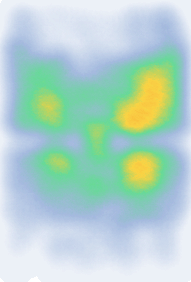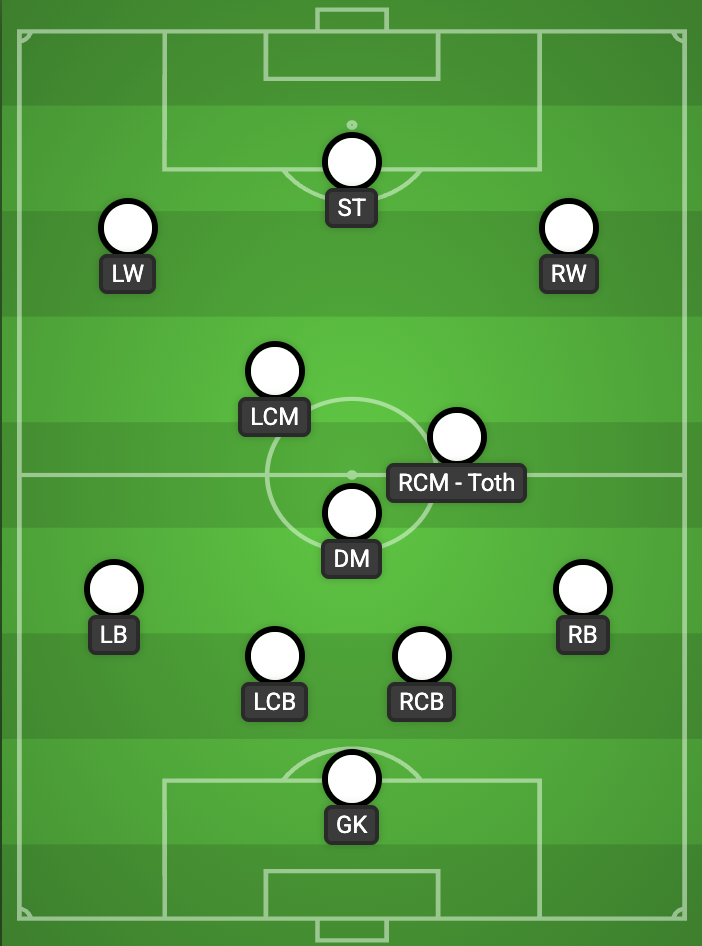Alex Tóth
Full Name: Alex Tóth
Date of Birth: October 23, 2005
Nationality: Hungarian 🇭🇺
Current Club: Ferencváros
League: Nemzeti Bajnokság I
Contract Expiry: June 30, 2027
Current MV: 2.50M
Preferred Foot: Right
Height / Weight: 1.81M
↑
← Heatmap
Best Suited To →
Role: Roaming Playmaker
Behaviors
On-Ball Behavior:
Early Receiver: Consistently drops between lines or towards the backline to offer a passing outlet.
Half-Turn Progressor: Opens body shape to face forward; looks to advance play immediately rather than recycle.
Short/Medium Distributor: Prioritizes secure, vertical passes into midfield/attack over risky switches.
Selective Long Passer: Capable of diagonals but only attempts when clear overload is spotted.
Shield & Retain: Uses arms and shoulders to hold off pressure while protecting ball on his right side.
Press Resistance: Calm when pressed, uses small touches and body orientation to escape pressure.
Chance Creation Link: Prefers through balls or combination play around the box to direct shooting
Off-Ball Behavior:
Press Trigger: Frequently steps forward to close passing lanes and force play wide.
Ground Duel Engagement: Willingly enters duels, often sliding to disrupt progression.
Aerial Limitation: Competes but rarely wins aerials; timing and physicality still underdeveloped.
Lateral Roamer: Constantly shifts across midfield to support ball-near teammate and provide link.
Pocket Occupier: Finds gaps just beyond the opponent’s first line, available for vertical progression.
Cover Runner: Tracks midfield runners into his zone without abandoning shape.
Bait & Release: Positions to draw pressure onto himself, then uses one-touch to exploit space created.
Technical & Tactical Profile
Tempo Control / Adaptability NT
- Adjusts game speed cleanly, reads momentum shifts early.
- Regular scanning underpins calm rhythm control.
Mental Wiring (Risk Appetite, Composure) NT
- Strong reaction to errors, rarely destabilized.
- Adapts mid-match; shows composure when state shifts DT.
- Balances risk with security; generally conservative CT.
Physicality / Duel Winning DT
- Solid ground duels, timing continues to refine.
- Aerial duels remain absent from profile AT.
Decision Speed NT
- Quick reactions in tight areas, retains clarity with pressure.
- Pre-receive choices developing; can telegraph passes at times DT.
Passing Range & Variety CT
- Reliable short and mid range. Longer switches appear when system provides width and time.
- Risk appetite leans safe; variety increases with tactical security.
Ball Retention under Pressure NT
- Secure first touch and half-turns create exits in traffic.
- Recovery after contact is coachable ST.
Summary
- Strengths: Tempo control, tight-area composure, consistent scanning.
- Risks: Physical resilience after contact, conservative risk profile.
- Verdict: Stable technical base with upside in range and aggression given the right environment.
- Profile Stability: Toth leans toward an Ultra-Stable Profile, his game is built on natural and steadily developing traits, with limited reliance on system-specific conditions.
Trait Key
NT Natural Trait — Core to player’s identity, unlikely to change.
DT Developing Trait — Room to grow, but observable tendency exists.
ST Suppressible Trait — Can be reduced or neutralized with coaching.
CT Contextual Trait — Emerges or disappears depending on system.
AT Absent Trait — Not part of player’s game. No evidence in profile, film, or tendencies.
Profile Stability Tiers
Ultra-Stable: Traits are largely natural or steadily developing. Highly transferable across leagues and systems.
Stable: Most traits intrinsic or developing, with some manageable system dependency.
Context-Sensitive: Requires specific tactical conditions to shine. Medium risk profile.
System-Dependent: Relies heavily on structure or coach’s scheme. Risky outside setup.
System-Creation: Output fabricated by system/role. Very high transfer risk.
Transferability & Scalability
Glossary of Traits
Cognitive Traits: Press Resistance, Decision-Making Speed, Spatial Awareness
Technical Execution: Ball Security, Passing Variety, First Touch
Tactical Intelligence: Defensive Positioning, Transitional Awareness
Physical & Psychological: Duelling/Physical Presence, Mentality/Composure
League Scores (1–10)
Premier League → 3/10
Physicality + transition demands don’t suit his current aerial/duel profile. Long-term maybe, but high risk now.
La Liga → 7/10
Cognitive + technical IQ league, slower tempo than Bundesliga, favors his scanning and passing. Strong fit.
Bundesliga → 6/10
High tempo and pressing chaos align well with his press resistance and mobility. Slight risk vs. physicality.
Serie A → 5/10
Tactical discipline fits his intelligence, but compact defensive spaces expose his limited aerial/physical edge.
Ligue 1 → 4/10
Duel intensity + chaos could overwhelm him. Would survive, but not the most natural fit.
Eredivisie → 8/10
High-possession, low-press environment maximizes his strengths (progression, composure, scanning). Excellent stepping stone.
Generic Trait Scale Glossary (1–10)
1 – Deficient: Consistently below professional standard. Major liability when tested in this area.
3 – Weak: Shows glimpses but unreliable. Can function in low-pressure moments but often exposed.
5 – Functional: Meets baseline professional competency. Adequate in most situations but not a strength.
7 – Strong: Above average for the level. Reliable, impactful, and holds up across different contexts.
10 – Elite: Defines games at the highest level. Exceptional, rare, and scalable to top competitions.
Projection & Risk Assessment
🔧 1. Development Risk
How likely is this player to not reach their expected technical, physical, or tactical potential?
| Score | Meaning | Indicators |
|---|---|---|
| 1 (Minimal Risk) | Already playing at high level for age; consistent starter; no major injury history; strong learning curve | >2000 senior mins/year, stable club, shows tactical discipline |
| 2 (Low) | Consistent developmental pathway, maybe small injury concern or plateauing at times | U21 mins + upward trajectory, mentally mature |
| 3 (Medium) | Decent base but red flags exist (inconsistency, stalling, low-level environment, minutes managed) | Bench role or reserves, decent but stagnant tools |
| 4 (High) | Poor development history, low minutes, injuries, miscast in current role, maturity questions | Bounces clubs, repeated injuries, no U21/first team pathway |
| 5 (Extreme) | Almost no evidence of upward curve, physical regression or consistent injuries; major red flag | Hasn’t played >500 mins in a season, out of favor at multiple clubs |
💰 3. Market Risk
How risky is this player from a valuation perspective (age, hype, exposure, volatility, transfer context)?
| Score | Meaning | Indicators |
|---|---|---|
| 1 (Minimal Risk) | Under-the-radar gem, low price, high upside | Cheap buy from under-scouted market (e.g., Balkans, Nordics) |
| 2 (Low) | Reasonable valuation for age/potential, not overhyped | Good fit financially, no major bidding war |
| 3 (Medium) | Slightly inflated due to club, media, or agent | Plays at high-visibility club, small overpay risk |
| 4 (High) | Overpriced or being shopped aggressively | Club actively pushing sale, no market bidding pressure |
| 5 (Extreme) | Big fee required and no guarantee of resale | Already failed at bigger club, high wage profile, agent-driven |
🧠 2. Psychological Risk
How much uncertainty exists around mentality, focus, motivation, and adaptability?
| Score | Meaning | Indicators |
|---|---|---|
| 1 (Minimal Risk) | Mature beyond years, proven adaptability, team-first attitude | No off-field drama, thrives under pressure, self-regulating |
| 2 (Low) | Good profile, small worries about competitiveness or emotionality | May need mentorship but highly coachable |
| 3 (Medium) | Sometimes drifts, hot-and-cold, needs structure | Prone to coasting in weaker environments |
| 4 (High) | Struggles with adversity, questionable attitude, arrogance or insecurity | Off-field incidents, doesn’t respond to tactical feedback |
| 5 (Extreme) | Actively sabotages growth. Ego-driven, mentally erratic, disciplinary issues | Known locker room problem, multiple coach/club clashes |
🧩 4. Systemic Risk
How heavily does this player rely on a specific system or role to succeed?
| Score | Meaning | Indicators |
|---|---|---|
| 1 (Minimal Risk) | Plays reliably across systems and role types | Press-resistant, strong spatial awareness, tactically flexible |
| 2 (Low) | Better in some setups but still contributes in multiple roles | Slight drop in output outside ideal role | 3 (Medium) | Clearly has a “best system” and drops off elsewhere | Needs possession-based system or double pivot partner |
| 4 (High) | Struggles when not in exact tactical blueprint | Lost without pressing cues, or weak in non-transition games |
| 5 (Extreme) | Unusable outside of a niche structure | Cannot press, cannot hold, cannot rotate positions |
Summary
Verdict Statement:
Press-resistant roaming playmaker who dictates tempo and progression in possession-dominant systems. Safe psychological and market profile, with scalability toward Bundesliga/Eredivisie, though ceiling is capped by limited aerials and lack of final-third punch.
Good/Bad Split
Good:
Elite press resistance and composure under pressure
Strong progression via short/medium passing and through balls
Mature scanning and tempo control for age
High defensive work rate and willingness to duel
Safe risk profile (development + market + psychology)
Bad:
Weak aerial game, unlikely to ever dominate physically
Not a natural goal threat (low shooting volume, limited ball striking)
Scalability may stall in most physical leagues without tactical cover
B.A.S.E. Potential Rating -
8/10: ⚽️ ⚽️ ⚽️ ⚽️ ⚽️ ⚽️ ⚽️ ⚽️
Projection: Starter at top-5 league or strong European club. Contributes at Champions League level, though not the central figure.





